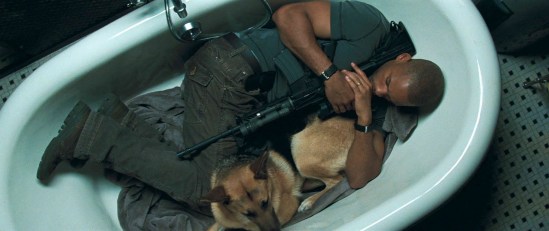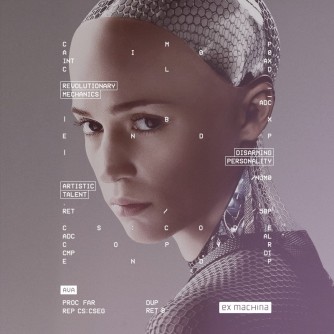 The film “I Am Legend” is a far too underrated zombie story. It is well acted, well written, well scored and well played over all. Though a few years old now, it is still a fine viewing film, especially for the Advent and Christmas seasons (yep! you heard right, and they did indeed release the film during Advent 2007, after all). Let me show you why zombies and theology mix well here.
The film “I Am Legend” is a far too underrated zombie story. It is well acted, well written, well scored and well played over all. Though a few years old now, it is still a fine viewing film, especially for the Advent and Christmas seasons (yep! you heard right, and they did indeed release the film during Advent 2007, after all). Let me show you why zombies and theology mix well here.
—
—
—
—SPOILER ALERT—
—
—
—
—–1) Tree of Knowledge of Good and Evil, and the Krippin Virus: both are good, and made with good intentions. The Tree that God made is by default good because He does not create anything less than good, because He is Goodness itself. The only bad was when Adam and Eve disobeyed God and doubted His goodness and love. They believed the lie and tried to usurp God. the consequences of this Original Sin are death, hatred, and evil in man. In the movie “I Am Legend,” the Krippin Virus is also made for good, but its consequences are too devastating to man.
 —–2) Season of Advent: the movie shows us that the beginning of the Krippin Virus (K.V.) outbreak was during the season leading up to Christmas time. Decorations are everywhere, and the decorations stayed up because the world fell apart waiting for a cure, a savior (magazine cover). We see that the effects of the virus are horrific
—–2) Season of Advent: the movie shows us that the beginning of the Krippin Virus (K.V.) outbreak was during the season leading up to Christmas time. Decorations are everywhere, and the decorations stayed up because the world fell apart waiting for a cure, a savior (magazine cover). We see that the effects of the virus are horrific
and ravaging, affecting soon all of mankind. This is an allegory for Original Sin and its consequences for all of us. The world is weary in fighting the illness of sin, with no hope of Heaven. At the same time, there are signs that God still loves us (throughout the movie). A motif representing this is the butterfly: a transformation from illness to health, from sinner to saint (i.e., same creature, different existence). So there is indeed hope, if we know how to read God’s signs, which increasingly become less and less random and more intentional. Advent is a time of waiting and preparation for Christians, and waiting for three things: a) Christmas as a memorial of Jesus’ birth, b) the coming of Jesus into our lives and hearts, c) the future Second-Coming of Jesus to judge the world in glory. And so we see int he film a perpetual advent, waiting for a cure, for salvation.
—–3) We are the infected in the film, sinners infected with concupiscence and death. Instead of destroying us in our evil (our illness), Jesus comes to redeem us. In the film, Neville does the same and seeks to cure us of our ills. Jesus is immune to our sins. Neville is immune to the virus. And Neville does not seek to wipe out all who have K.V., but rather hopes to help them, to save them.
—–4) In order to help us though, Jesus was born of a woman, Mary, who is a woman of great faith. Neville, in order to help us, also needs to be cared for by a woman of great faith. Please see points #9 and #11 for more about this.
—–5) As sin is atoned for by the shedding of blood (think of the Israelite animal sacrifices), Neville also sheds blood in order to cure us (i.e., he sacrifices himself for us, and the immunity to K.V. is in his blood). Jesus, of course is the true sacrifice who died to redeem all of us; it is Christ’s precious blood that saves us.
—–6) Fisherman: Dr. Neville is shown to be a fisherman a few times in the film, either when he says “Like fishing in the dark, son” or when he is actually fishing. Now, the fisherman is a metaphor Jesus used also in the Gospels, not to mention that most of His apostles were actual fishermen (Peter and Andrew, James and John).
—–7) There is also the display of prayer in the film: Neville’s wife praying with Robert and their daughter before the family separates. We see here that the family is Christian and prayerful, devout enough to pause during an intense evacuation to petition Christ. They know who is the Lord and who is in charge (even though Neville later loses his faith).
—–9) “They won’t stop.” Neville says this toward the end of the film, realizing that the infected (the dark seekers) will not stop trying to kill him. This applies to Christian theology in that we sinners will not stop sinning, because we cannot stop on our own strength. We will live forever in our sins, unless we have help from someone above us (above sin), greater than us (greater than sin and its effects [death]), someone who is not ill (not a sinner) and has never been ill (never sinned) and cannot become ill (cannot sin). Coupled with all the talk and symbolism about “listening” and “light” and the analogy of the film to Christian theology only grows.
“I’m listening,” “the world is quieter now, if you listen, we can hear God’s plan,”: listening and finding the space, time and silence to listen in our prayer is essential. See how Neville misses all the signs God has provided for him (the butterflies), to encourage and assure him in his waning faith. See how Anna (the name of St. Mary’s mother, by the way) has learned to hear God and hold fast to Him in the darkness. See how the light works in the film: sinners (dark seekers) live and hide in the darkness, and those who are redeemed in Christ (those immune to K.V.) live in the light. Jesus, the Light of the World, is what the film is hinting at with this symbol.
—–10) “Don’t worry about a thing, because every little thing is gonna be all right…” This song is not only optimistic, but it’s the Christian way to live, because we know Christ not only was born to save us, but he died to save us, and he even came back from the dead for us! A God who loves that much, who is that powerful and close to us means we have nothing to worry about. True Christians do not worry about a thing because every little thing is gonna be all right, because the Lord is in charge — not us, not the devil, not the universe. Only Him. And He loves us.
—–11) Now if all these subtle nudges that the movie is a Christian allegory does not work enough, then there is the obvious rosary. Not only does it appear on Neville’s birthday (symbolizing Christmas, Mary, Jesus’ birth), but it also appears right at the moment when Neville is nearest to death, nearest despair. Yet, because he is meant for a mission, a woman arrives to help him bearing a rosary: the symbol and prayer of THE WOMAN: MARY, the Mother of God. This is not only important in the film, but also for us: we need the help of our mother’s (St. Mary) prayers. Jesus entrusted us to her care (John 19:25-27), and she is His mother. Think about this: she is His mommy, which means she loves Him more than any of us can, and He (because he is the perfect human being, and therefore the perfect child) loves her more than any of us can. “Never be afraid of loving Mary too much. You can never love her more than Jesus does.” -St. Maximilian Kolbe.
—–12) Finally, once at the survivor’s colony (sort of like a promised land, a haven… a heaven), the first thing we see when the gates are opened is… a church with bells ringing. And Anna and Ethan would never have made it were it not for Neville’s sacrifice: we will never make it home to heaven if not for Christ’s.
—–13) And the date of the cure’s discovery is September 9th. If you are reading this and this date means something to you (you know who you are), then you know why this detail is important to me.
*Special thanks to HLD, an old friend who shared most of these insights with me years ago.


 —–9) Finally, more about the Turing Test. One of the classes taken enroute my philosophy degree focused on the metaphysics of man, and one of the best texts covering this was
—–9) Finally, more about the Turing Test. One of the classes taken enroute my philosophy degree focused on the metaphysics of man, and one of the best texts covering this was 



![[from W. Norris Clarke's "The One and the Many"]](https://holysmack.files.wordpress.com/2014/11/infinite-regress.jpg?w=549&h=549)

